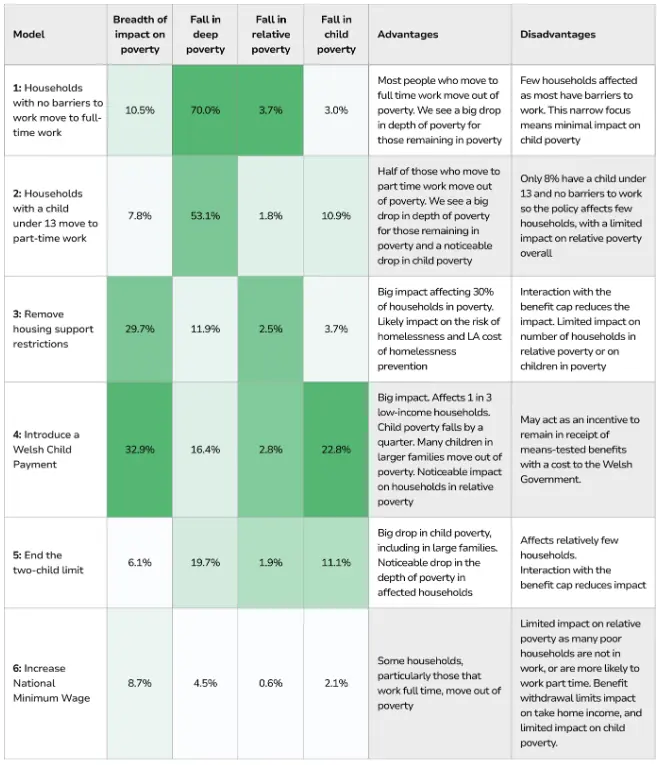
Report
An examination of the impact of policy interventions designed to reduce poverty in Wales
Read the full report
Overview
Poverty in Wales remains persistent and disproportionately affects children, with rates that exceed the UK average. Although the Welsh Government has reaffirmed its commitment to tackling deprivation, particularly child poverty, there is still limited clarity about which policy interventions can deliver the most meaningful impact.
Funded by the Bevan Foundation and its partners, and produced by Policy in Practice, this report evaluates the effectiveness of six anti-poverty policy interventions. Using administrative data from two Welsh local authorities, we model the potential impact of each intervention and compare their effectiveness in reducing poverty.
The interventions are assessed across four key dimensions:
-
- The number of households affected (breadth of impact)
- The extent to which households are lifted above the poverty line (reduction in relative poverty)
- The severity of hardship for those remaining below the poverty line (depth of poverty)
- The effect on child poverty
Policy recommendations
Based on the evidence from this analysis, the Welsh Government should:
-
- Explore mechanisms to introduce a Welsh Child Payment, the powers of the Welsh Government may not extend to the introduction of a Welsh Child Payment. However, the Welsh Government should explore mechanisms, such as grant-based schemes or top-up payments, to deliver direct financial support to children in low-income households. This intervention offers the most significant reduction in child poverty and supports vulnerable families most at risk
- Expand access to childcare and flexible employment support, particularly for single parents and carers, to enable part-time work and help families transition out of poverty
- Advocate for reform or devolution of key UK welfare policies, including the two-child limit and housing support rules, to gain greater flexibility in designing a system that meets the needs of Wales
- Enhance discretionary housing support, such as through expanded Discretionary Housing Payments, to offset the impact of housing support restrictions
- Prepare for the impact of UK-wide disability benefit reforms by targeting responsive support measures at those affected
- Embed a multi-dimensional poverty strategy, focused on both the scale and severity of poverty, with clear prioritisation of child poverty reduction
Conclusion
This research highlights that while no single policy can eliminate poverty in Wales, targeted interventions, especially those focused on children, can drive meaningful progress. The urgency of action is amplified by planned UK Government changes to disability benefits, which are likely to disproportionally increase poverty in Wales.
Amongst the policies assessed, a child-focused support payment and tailored employment assistance are shown to be the most effective. However, employment-based measures are limited by the significant barriers to work faced by many low-income households. The reversal of welfare policies like the two-child limit and the reduction in housing support would help to reduce poverty but their impact is limited due to the interaction with the benefit cap.
Reducing poverty in Wales will require a dual approach: using existing devolved levers to full effect while seeking the power and funding necessary to address systemic failures in the UK-wide social security system.





